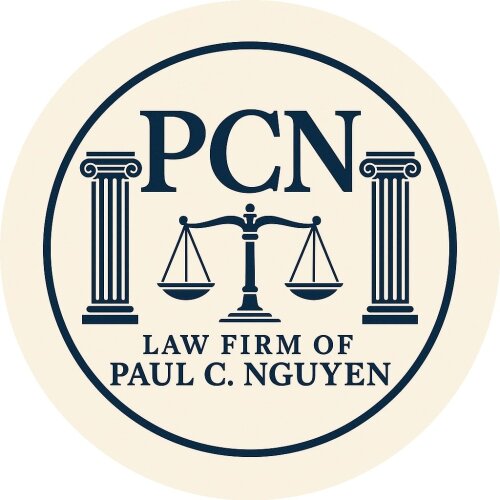Best Conveyancing Lawyers in California
Share your needs with us, get contacted by law firms.
Free. Takes 2 min.
Free Guide to Hiring a Real Estate Lawyer
Or refine your search by selecting a city:
List of the best lawyers in California, United States
About Conveyancing Law in California, United States
Conveyancing in California refers to the legal process of transferring ownership of real property from one person or entity to another. This process involves both the preparation and the execution of legal documents, as well as ensuring that property title is transferred correctly and free from legal disputes. In California, residential and commercial real estate sales, refinancing, gifting of property, and inheritance matters often require careful conveyancing to comply with state regulations and local practices. The process aims to protect the interests of both buyers and sellers by ensuring legal compliance, proper recording of documents, and the settlement of any outstanding issues related to the property.
Why You May Need a Lawyer
While some straightforward property transactions may be completed without legal counsel, there are several scenarios where consulting an attorney experienced in conveyancing is critical. These situations include:
- Complicated property titles, such as those involving inherited land, multiple owners, or unresolved liens.
- Disputes over property boundaries or encroachments.
- Commercial property sales or purchases, which have complex legal and zoning requirements.
- Short sales, foreclosures, or distressed property transactions.
- Preparing or reviewing purchase agreements, deeds, and disclosure documents.
- Ensuring compliance with California’s strict disclosure laws, especially in cases of known defects or prior repairs.
- Resolving title issues such as unpaid taxes, easements, or rights of way.
A conveyancing lawyer can help you avoid costly mistakes, ensure all documents are properly executed, and represent your interests in negotiations or disputes.
Local Laws Overview
Conveyancing in California is governed by a combination of state statutes, local ordinances, and customary practices. Key aspects include:
- Title and Escrow Services: Most transactions in California involve independent escrow companies and title insurers. Escrow holders act as neutral third parties to manage documents, funds, and closing activities.
- Disclosure Requirements: Sellers are legally required to disclose all known material facts about the property. Common forms include the Transfer Disclosure Statement (TDS) and the Natural Hazard Disclosure (NHD).
- Grant Deeds and Quitclaim Deeds: These are the principal forms used to transfer title. Each has specific use cases and legal implications.
- Recording: All transfers of property must be recorded at the county recorder’s office where the property is located. Failure to record can result in loss of legal rights to the property.
- Tax Implications: Buyers may be subject to property transfer taxes, documentary transfer tax, and changes in property tax assessment under Proposition 13 rules.
- Financing and Loans: Lenders may require additional documentation or conditions for financing to be completed and for the loan to fund the purchase.
- Environmental and Zoning Compliance: Some areas have specific requirements regarding land use, hazardous materials, or local zoning laws, especially for commercial properties.
Frequently Asked Questions
What is conveyancing and who handles it in California?
Conveyancing is the legal process of transferring property ownership. In California, this process often involves real estate agents, escrow officers, title companies, and sometimes attorneys for more complex transactions.
Do I need a lawyer for buying or selling a house in California?
Legal representation is not always required by law but is highly recommended for transactions involving legal complications, non-standard agreements, or when you want assurance that your interests are protected.
What documents are required for conveyancing in California?
Common documents include the purchase agreement, grant deed or quitclaim deed, property disclosures, title report, loan documents (if applicable), and the closing statement.
How long does the conveyancing process take in California?
A typical residential conveyance takes about 30 to 45 days from acceptance of an offer to closing. Delays may occur due to title issues, financing, or other contingencies.
What fees are involved in California conveyancing?
Buyers and sellers may both be responsible for different fees, including escrow fees, title insurance, recording fees, and transfer taxes. Costs may vary by county and agreement.
Are there special property disclosure requirements?
Yes, California has strict disclosure laws. Sellers must disclose known material defects, past repairs, environmental hazards, and provide government-mandated forms such as the TDS and NHD.
What are my rights if title defects are discovered after purchase?
You may have recourse through title insurance or legal action if unreported title defects cause financial harm or limit your property rights.
How does escrow work in California?
Escrow is a neutral holding process where an independent company manages all funds and documents until all parties meet their obligations, after which the property title is transferred.
Can I transfer property as a gift in California?
Yes, property can be transferred as a gift, often using a quitclaim deed. There may be tax implications, and documentation must still be properly prepared and recorded.
What happens if there are liens or disputes on the property?
All liens or disputes should be resolved before transfer. A lawyer or title company can help clear these issues and ensure that the new owner receives clear title.
Additional Resources
Several resources can help you understand and navigate conveyancing in California:
- California Department of Real Estate - Regulates real estate licensing and provides consumer education materials.
- County Recorder’s Office - Handles the official recording of property documents in each county.
- California Land Title Association (CLTA) - Provides guidance on title insurance and real estate transactions.
- California State Bar - Offers lawyer referral services and consumer guides.
- Local legal aid organizations - Many counties have organizations that provide free or low-cost legal advice for real estate matters.
- Local real estate professionals - Licensed brokers and escrow officers are familiar with local practices and requirements.
Next Steps
If you require legal assistance with conveyancing in California, it is important to act as soon as possible to avoid unnecessary delays or complications. Consider the following steps:
- Gather all property documentation, including previous deeds, disclosure forms, and any correspondence related to the property.
- Contact a qualified real estate attorney or request a referral from the California State Bar or a trusted real estate professional.
- Discuss your specific needs, potential concerns, and any complexities involved in your transaction.
- Review fee agreements and ensure you understand the lawyer’s role in your transaction.
- If your transaction is already in process with an escrow company or title insurer, notify them that you are obtaining legal counsel.
Taking these steps will help safeguard your interests, ensure compliance with California’s conveyancing laws, and ultimately provide peace of mind throughout your property transaction.
Lawzana helps you find the best lawyers and law firms in California through a curated and pre-screened list of qualified legal professionals. Our platform offers rankings and detailed profiles of attorneys and law firms, allowing you to compare based on practice areas, including Conveyancing, experience, and client feedback.
Each profile includes a description of the firm's areas of practice, client reviews, team members and partners, year of establishment, spoken languages, office locations, contact information, social media presence, and any published articles or resources. Most firms on our platform speak English and are experienced in both local and international legal matters.
Get a quote from top-rated law firms in California, United States — quickly, securely, and without unnecessary hassle.
Disclaimer:
The information provided on this page is for general informational purposes only and does not constitute legal advice. While we strive to ensure the accuracy and relevance of the content, legal information may change over time, and interpretations of the law can vary. You should always consult with a qualified legal professional for advice specific to your situation.
We disclaim all liability for actions taken or not taken based on the content of this page. If you believe any information is incorrect or outdated, please contact us, and we will review and update it where appropriate.
Browse conveyancing law firms by city in California
Refine your search by selecting a city.














